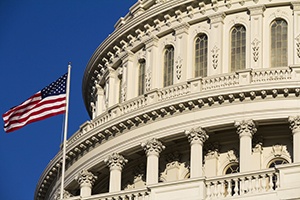 For the first time in a while, the U.S. has a major free trade agreement on the agenda. Trade is an interesting intersection of economics and politics, as we’ve seen in today’s news, which features President Obama and the Senate majority leader, Mitch McConnell, working together for the first time in, well, ever, to overcome Democrats’ objections.
For the first time in a while, the U.S. has a major free trade agreement on the agenda. Trade is an interesting intersection of economics and politics, as we’ve seen in today’s news, which features President Obama and the Senate majority leader, Mitch McConnell, working together for the first time in, well, ever, to overcome Democrats’ objections.
Politics makes strange bedfellows, it’s true, but something this curious warrants a closer look.
The scuffle over fast-track authority
I should point out that we haven’t actually gotten to the trade agreement yet. The political fight right now is over fast-track authority, which allows the president to negotiate an agreement and then have Congress vote on it, but forbids Congress from trying to amend the agreement.
After all, foreign countries have absolutely no incentive to make painful compromises if they believe any agreement will be nitpicked to death back in the U.S. If it’s a bad deal overall, Congress can still disapprove it, but it will be a straight up or down decision.
In the past, this Congressional hand-tying has been a standard, fairly uncontroversial procedure for trade deals. This time, though, several factors have made it more contentious than usual.
The dollar has strengthened to an unusual degree this year. China has always been considered a “currency manipulator,” but now both Japan and Europe are following similar policies. Under these circumstances, free trade can look more like simply shipping jobs abroad. Recent data shows that the return of manufacturing jobs to the U.S. has slowed—and many blame the strong dollar.
Mix this with general economic uncertainty and a possibly slowing recovery, and it’s easy to understand why many people and politicians see more risk than opportunity in another free trade deal.
Where do we stand on trade?
None of this is unique; in fact, this type of reaction is the reason the fast-track procedure was created in the first place. Rather than giving every interest group an opportunity to carve out its own special favor, the agreement has to be evaluated as a whole—in theory, allowing politicians to rise above petty interests and judge it based on the overall effect on the country.
It’s never that simple, of course—and this time will be even more complicated. World trade is vastly freer than it has been in the past, and the incremental gains from any new agreement, although quite possibly worth having, will necessarily be smaller. And, as the gains get smaller, the specific costs may rise.
In the age of competitive devaluations and the new mercantilist policies of many countries, along with the shifting economic weights between the U.S. and the rest of the world, it’s worth thinking through where we stand on trade from first principles.


 Print
Print


